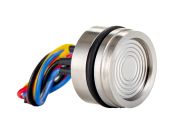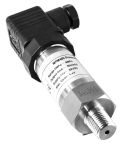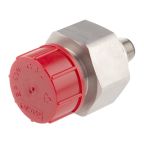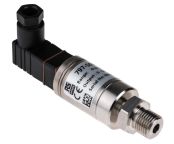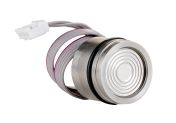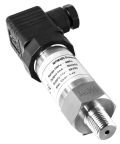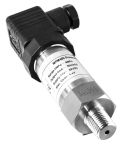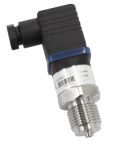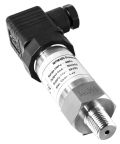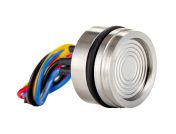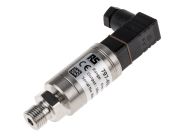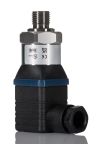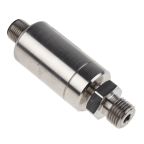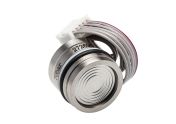Pressure Sensors
Pressure sensors are devices that sense the applied pressure of gases or liquids. The output of the measurement is then converted into an electrical signal which reflects the amount of pressure applied.
Pressure Sensor Technologies
There are various sensor technologies used within pressure sensor devices. Depending on the measurement requirements, this can influence their sensing accuracy and reliability. The mechanical displacement within the sensor is turned into an electrical output signal which is achieved with 5 different methods.
- Resistive Sensors - These types of sensors use the change in electrical resistance of a strain gauge connected to the diaphragm.
- Capacitive Sensors - Are highly sensitive and are able to measure low pressure under 10 bar while still withstanding large overloads.
- Piezoelectric Sensors - These sensors use substances like Quartz to generate a charge on the surface when pressure is applied. Piezoelectric pressure sensors are ideal for measuring fast changing pressures.
- Optical Sensors - These use interferometry to measure pressure changes in optical fibre. They are not disturbed by EMI and can be used in noisy or medical environments.
- MEMS – Short for micro-electro-mechanical system and contains capacitive or piezo pressure sensing mechanisms on silicon at micron level resolution.
Types of Pressure Sensors
There are various properties which can be used to classify the type of sensor it is and its appropriate application, including; what pressure range they measure, their operating temperature range or the pressure type they measure.
- Absolute Pressure Sensor - This type of sensor measures pressure relative to the perfect vacuum (zero reference point).
- Gauge Pressure Sensors - These are often used to measure atmospheric pressure and are sometimes referred to as relative pressure sensors.
- Sealed Gauge Pressure Sensors - Similar to gauge pressure sensors except they measure pressure relative to a fixed pressure, not the current ambient atmospheric pressure which can vary.
- Differential Pressure Sensors - These can be used to measure the difference between two different pressures (differential pressure) which can be connected to either side of the sensor. They are often used to measure pressure drops, fluid levels and flow rates.
Pressure Transducer vs. Pressure Switch
Pressure transducers and pressure switches are two fundamental types of pressure sensors used widely across various industries, but they serve different functional purposes and are suited for different applications.
Pressure Transducer
- Function: Converts physical pressure into an analog or digital electrical signal that varies proportionally with the pressure applied.
- Applications: Ideal for continuous monitoring in systems like fluid dynamics, HVAC controls, and automotive engine systems, where constant pressure feedback is necessary for operational efficiency and safety.
Pressure Sensor Switch
- Function: Operates on a simple mechanism that triggers a response at a preset pressure level, typically to turn on or off a device.
- Applications: Commonly used in safety and alarm systems, air compressors, and pumps where specific pressure thresholds need to maintain system integrity or prevent equipment failure.
Pressure Sensor Applications
Pressure sensors play a crucial role in a variety of industrial applications, ensuring accuracy, safety, and operational efficiency:
- Medical Equipment: Monitor patient's vital signs, ventilators, and blood pressure devices to ensure patient safety.
- Aviation: Used for altitude sensing, cabin pressure control, and various hydraulic systems to maintain aircraft performance.
- Automotive: Monitor engine oil pressure, fuel pressure, and tyre pressure to enhance vehicle efficiency and safety.
- Marine: Track bilge water levels, engine oil pressure, and hull stress in ships to prevent mechanical failures.
- HVAC Systems: Regulate air and water pressure in heating, ventilation, and air conditioning systems for optimal environmental control.
- Process Industries: Control and monitor pressure in pipelines and tanks to prevent leaks and maintain system integrity.
- Hydraulics: Essential in hydraulic systems for pressure control and monitoring to ensure proper machine operation.
- Manufacturing: Monitor press machines and pneumatic systems to maintain consistent product quality.
How to Choose the Right Pressure Sensor for Your Needs
Choosing the right pressure sensor involves several considerations to ensure optimal functionality and compatibility. Evaluate the required pressure range, media compatibility (gas, liquid, or corrosive substances), and environmental conditions (temperature, humidity, electromagnetic interference). Additionally, consider the necessary accuracy, response time, and output type for your application.
RS is renowned for being a top-notch supplier providing a diverse selection of high-quality pressure sensors and transducers from leading manufacturers at affordable prices, ensuring reliability and precision for a wide range of industrial applications. Our expert team can guide you to the best choice for your specific needs.
How to Order Pressure Sensors from RS?
RS is your reliable source for a broad range of pressure sensors and other types of sensors like water level sensors and airflow sensors from industry-leading brands, ensuring that you can find and buy the best solutions for your specific requirements. To place an order online, simply browse our extensive catalogue, filter your preferred products based on our extensive specifications, and add to your cart.
How Delivery Works at RS Hong Kong
At RS Hong Kong, we provide a variety of flexible delivery options designed to meet your specific needs, ensuring that your pressure sensors arrive when you need them. For more details on our delivery services and fees, please refer to our Delivery Information page.
Popular Searches
Related links
- Pneumatic Pressure Sensors
- Pressure Test & Measurement
- Telemecanique Sensors Pressure Switch, Screw Clamp
- Telemecanique Sensors Pressure Switch 5bar Max, Analogue Output
- Gems Sensors Pressure Switch 300psi Max, SPDT Output
- Gems Sensors Pressure Switch 3000psi Max, SPDT Output
- Telemecanique Sensors Pressure Switch 0bar Max Differential Reading
- Telemecanique Sensors Pressure Switch 0bar Max, 2x PNP-NO/NC Output

